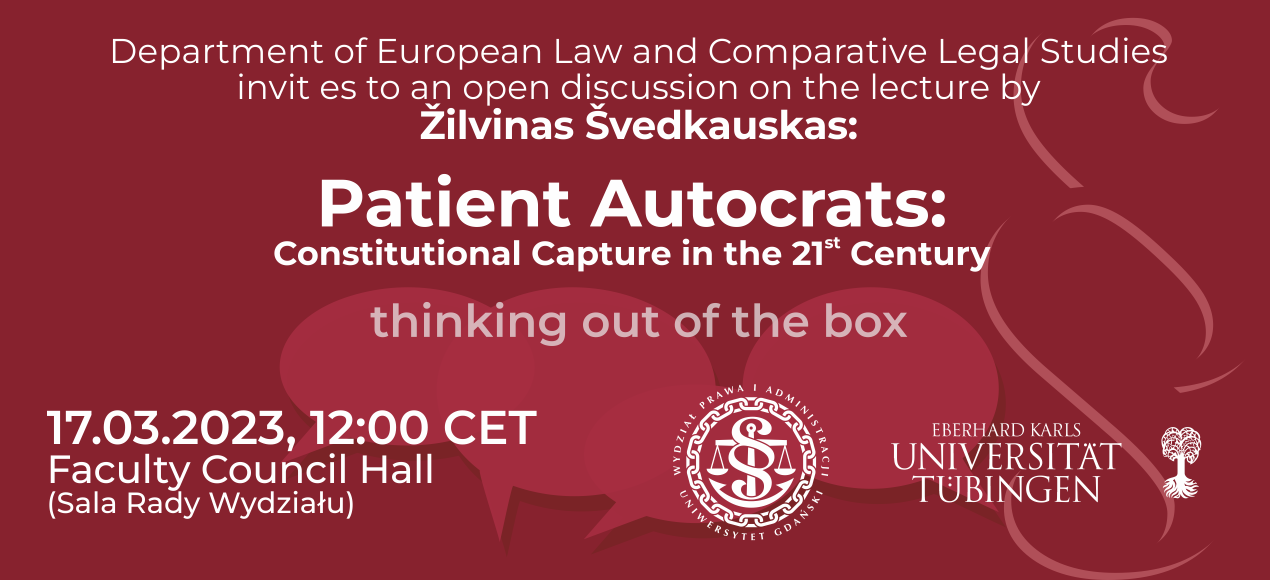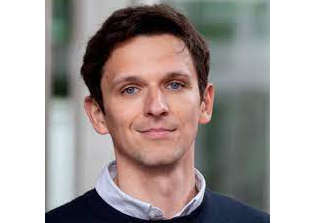Lecture by Žilvinas Švedkauskas on "Patient Autocrats: Constitutional Capture in the 21st Century".

Department of European Law and Comparative Legal Studies invites to an open discussion on the lecture by Žilvinas Švedkauskas: „Patient Autocrats: Constitutional Capture in the 21st Century. Thinking out of the box”.
 Žilvinas Švedkauskas is a PhD candidate in comparative politics at Eberhard-Karls-Universität Tübingen and a Bucerius Fellow of the “Trajectories of Change” programme at ZEIT-Stiftung Ebelin und Gerd Bucerius, specializing in comparative politics and democratization. His research focus lies in constitutional change and digital transformation in Africa, Middle East, and Central Eastern Europe. Žilvinas holds a joint MA degree in Comparative & Middle East Politics from Tübingen University and the American University in Cairo.
Žilvinas Švedkauskas is a PhD candidate in comparative politics at Eberhard-Karls-Universität Tübingen and a Bucerius Fellow of the “Trajectories of Change” programme at ZEIT-Stiftung Ebelin und Gerd Bucerius, specializing in comparative politics and democratization. His research focus lies in constitutional change and digital transformation in Africa, Middle East, and Central Eastern Europe. Žilvinas holds a joint MA degree in Comparative & Middle East Politics from Tübingen University and the American University in Cairo.
Žilvinas is also the Managing Director at OSMOS, a Lithuanian think-and-do tank leading the EU-endorsed “Digital Explorers,” the first of its kind legal migration pathway connecting Baltic and African ICT ecosystems.
Doctoral dissertation:
“Patient Autocrats: Constitutional Capture in the 21st Century”
Abstract of the lecture:
How does constitutional change facilitate autocratization? Aiming for a humble contribution to a better understanding of such a geographically heterogeneous phenomenon as the present reverse wave of democracy, the dissertation seeks to provide a theoretically and empirically informed analysis of contemporary constitutional capture. Shortly defined as systematic and intentional weakening of the checks and balances entrenched in the constitutional system, in order to strengthen the incumbents and impede the possibility of a genuine change of government, this phenomenon has so far been overlooked by students of comparative politics but is undoubtedly very telling about broader strategies of authoritarian actors and regimes.
Locating points and steps of overlap, the project aims to sketch a theoretical mechanism of constitutional capture by drawing on a comparison of 4 contemporary cases, representing different stages of autocratization marked by successful attempts of meddling with present constitutional order: Poland (a case of democratic recession), Hungary (a case of democratic backsliding/ breakdown), Turkey (a case democratic breakdown) and Egypt (a case of authoritarian consolidation). The dissertation inquiries about relevant choices and choosers behind the mechanism of constitutional capture, leading from the incumbent entry point to substantial loosening or removal of checks and balances on his/ her power.
Concluding, the dissertation reflects on how the literature on authoritarian strategies and constitutional change could be further linked together for a better understanding of contemporary
challenges facing democracy and feasible European democracy promotion/ autocracy prevention countermeasures.
Due to the interdisciplinary (law, politics, sociology) nature of Mr. Žilvinas Švedkauskas' doctoral dissertation, the Faculty of Economics and Social Sciences of the University of Tübingen passed a decision in 2022 to appoint Prof. Tomasz Tadeusz Koncewicz to serve as the doctoral supervisor of Mr. Žilvinas Švedkauskas. The second PhD supervisor is Prof. Oliver Schlumberger of the Institute of Political Science of the Faculty of Economics and Social Sciences of the University of Tübingen
The commentator of Žilvinas Švedkauskas' speech will be Dr. Marcin Michalak from the Department of European Law and Comparative Legal Studies.
The discussion will be moderated by Prof. Tomasz Tadeusz Koncewicz – Head of the Department.
The lecture provides a great opportunity to exchange views on not only the novel concept of "constitutional capture", new threats to democracy in the world and the evolution (problematization) of authoritarian systems, but also to hold a discussion around the methodology of writing interdisciplinary dissertations and the challenges involved. All this requires a willingness to face the title challenge of "thinking out of the box."
We hope it will be of value to young academics in particular, who are especially invited to attend the lecture and the discussion that follows.




